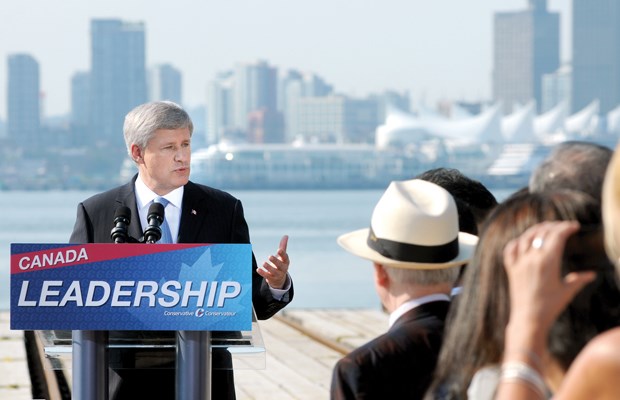If re-elected, the Conservatives would begin collecting data on foreign “non-resident” ownership in housing and intervene in the market if it is making cities unaffordable for young families.
Conservative leader Stephen Harper made the announcement during a campaign stop in Seaspan’s North Vancouver shipyard on Wednesday, with one of the world’s most expensive cities looming in the background.
Beyond home ownership providing families with an investment and stability, “the family home is where their dreams live,” Harper said.
“There are real concerns that foreign, non-resident real estate speculation is the reason some Canadian families find house prices beyond their budgets.
By some estimates, as many as 15 per cent of the condos in Vancouver sit empty. No dreams are living there,” he said. “If such foreign, non-resident buyers are artificially driving up the cost of real estate and Canadian families are shut out of the market, that is a matter we can and should do something about.”
Harper suggested that may take the form of taxes or preventing foreigners from buying any new housing stock and forcing temporary residents to sell their homes when they leave the country, similar to policies in place in Australia and the United Kingdom.
As part of the same stump speech, Harper said his next government would raise the amount Canadians can withdraw tax free from RRSP accounts for the purchase of their first home, from $25,000 to $35,000.
North Vancouver Liberal candidate Jonathan Wilkinson characterized Harper’s announcement as a “knee-jerk” reaction to the foreign ownership issue after his government has ignored it while in power for almost 10 years.
“Housing affordability is obviously a big, big issue in Vancouver but it’s been a big issue for a long time. I think it’s pretty astounding that we don’t already have the data that’s necessary to assess the extent to which foreign money is influencing (the market) and what the appropriate policy prescriptions are,” he said. “And a government that has eliminated the long-form census has shown it’s not very interested in data.”
The Liberals are promising the return of a national housing strategy that includes not just ownership concerns, but also increasing the supply of rental and affordable housing.
NDP candidate Carleen Thomas said her party is also pursuing its own plan.
“(Thomas) Mulcair has said the federal government should be working with the provinces and communities around specific concerns . . . including housing,” she said.
Thomas noted Burnaby-Douglas NDP MP Kennedy Stewart introduced a motion to the House of Commons last fall calling for an affordable housing strategy that would expand federal investment in social housing and examine the impacts of investor speculation.
University of B.C. geography professor and real estate expert David Ley said he welcomes the issue entering the national conversation.
“I think it’s an important development. Of course, we have to see what substance lies behind the rhetoric,” he said.
Ley cautioned the issue is not so much people in other countries buying in and influencing the market as it is foreign capital, particularly from Asia.
“I think we have a number of cases where people have temporary residence here and are making use of offshore capital to purchase property here and thus they appear as local,” he said. “That, I think, accounts for quite a lot of buying in this part of the world and of course, it is adding to the affordability problems here.”
Ley added the measures announced could be a case of closing the barn door after the horse is out.
“This is a process that’s been going on since Expo 86,” he said.
Ley said he was surprised to see the housing issue in the Conservative’s campaign platform, given the Tories’ typical pro-market ideology.
“I would say this is a welcome development. We had been looking for leadership from the province but it has not been forthcoming,” he said.



